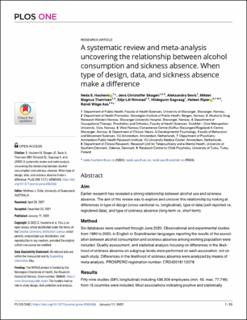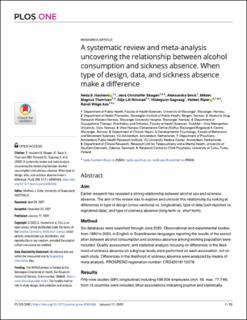| dc.contributor.author | Soleiman Pour Hashemi, Neda | |
| dc.contributor.author | Skogen, Jens Christoffer | |
| dc.contributor.author | Sevic, Aleksandra | |
| dc.contributor.author | Thørrisen, Mikkel Magnus | |
| dc.contributor.author | Rimstad, Silje Lill | |
| dc.contributor.author | Sagvaag, Hildegunn | |
| dc.contributor.author | Riper, Heleen | |
| dc.contributor.author | Aas, Randi Wågø | |
| dc.date.accessioned | 2022-10-21T07:46:10Z | |
| dc.date.available | 2022-10-21T07:46:10Z | |
| dc.date.created | 2022-01-12T19:11:36Z | |
| dc.date.issued | 2022 | |
| dc.identifier.issn | 1932-6203 | |
| dc.identifier.uri | https://hdl.handle.net/11250/3027470 | |
| dc.description.abstract | AIM: Earlier research has revealed a strong relationship between alcohol use and sickness absence. The aim of this review was to explore and uncover this relationship by looking at differences in type of design (cross-sectional vs. longitudinal), type of data (self-reported vs. registered data), and type of sickness absence (long-term vs. short-term). METHOD: Six databases were searched through June 2020. Observational and experimental studies from 1980 to 2020, in English or Scandinavian languages reporting the results of the association between alcohol consumption and sickness absence among working population were included. Quality assessment, and statistical analysis focusing on differences in the likelihood of sickness absence on subgroup levels were performed on each association, not on each study. Differences in the likelihood of sickness absence were analyzed by means of meta-analysis. PROSPERO registration number: CRD42018112078. RESULTS: Fifty-nine studies (58% longitudinal) including 439,209 employees (min. 43, max. 77,746) from 15 countries were included. Most associations indicating positive and statistically significant results were based on longitudinal data (70%) and confirmed the strong/causal relationship between alcohol use and sickness absence. The meta-analysis included eight studies (ten samples). The increased risk for sickness absence was likely to be found in cross-sectional studies (OR:8.28, 95% CI:6.33-10.81), studies using self-reported absence data (OR:5.16, 95% CI:3.16-8.45), and those reporting short-term sickness absence (OR:4.84, 95% CI:2.73-8.60). CONCLUSION: This review supports, but also challenges earlier evidence on the association between alcohol use and sickness absence. Certain types of design, data, and types of sickness absence may produce large effects. Hence, to investigate the actual association between alcohol and sickness absence, research should produce and review longitudinal designed studies using registry data and do subgroup analyses that cover and explain variability of this associations. | |
| dc.language.iso | eng | |
| dc.title | A systematic review and meta-analysis uncovering the relationship between alcohol consumption and sickness absence. When type of design, data, and sickness absence make a difference | |
| dc.title.alternative | A systematic review and meta-analysis uncovering the relationship between alcohol consumption and sickness absence. When type of design, data, and sickness absence make a difference | |
| dc.type | Peer reviewed | |
| dc.type | Journal article | |
| dc.description.version | publishedVersion | |
| dc.description.version | publishedVersion | |
| dc.source.journal | PLOS ONE | |
| dc.identifier.doi | 10.1371/journal.pone.0262458 | |
| dc.identifier.cristin | 1979931 | |
| dc.relation.project | Universitetet i Stavanger: IN-11551 | |
| dc.relation.project | Norges forskningsråd: 260640 | |
| cristin.ispublished | true | |
| cristin.fulltext | original | |
| cristin.fulltext | original | |
| cristin.qualitycode | 1 | |

